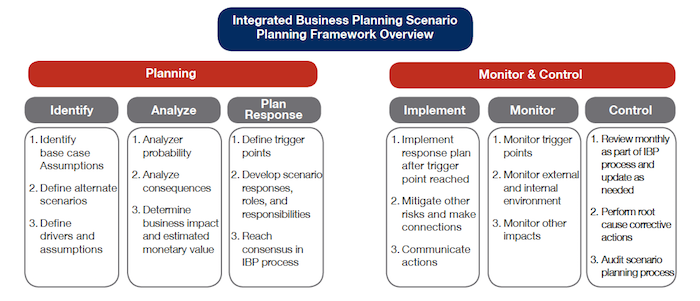By Pamelyn Lindsey, CSCP, Oliver Wight Business Advisor
This blog is part of a learning series on Scenario Planning. Please check out our other pieces on this topic: white paper and webinar.
There is a tendency to think of business plans as being cast in stone. It can be uncomfortable when things happen that threaten the plan, even on the upside.
Best practice Integrated Business Planning (IBP) includes a review of assumptions and, when needed, scenario planning. Wise business leaders think in terms of the current reality, alternatives, best-case and worst-case scenarios.
Integrated Business Planning is a cross-functional process. Leaders of the Product Management, Demand, Supply, Finance, and Integrated Reconciliation Reviews need to be well skilled in scenario planning as well as risk and opportunity assessment.
In my experience, the development of scenarios is an acquired skill. From a process safety perspective, risk management and scenario planning are on-going processes for many capital-intensive businesses where incidents can be catastrophic or disruptive to company revenue.
I spent a good part of my career in the chemical industry in process safety and risk management as well as supply chain management. When helping to lead the implementation and operation of IBP, it was easy to grasp how scenario planning would make IBP more effective and drive improved financial results.
To get started with Scenario Planning in Integrated Business Planning, here are some How-Tos:
1. Agree on a Framework
The Project Management Institute’s Risk Management framework is a useful model to adapt for IBP scenario planning as well as risk and opportunity assessment.(1) Here’s an example of how the PMI framework can be adapted for IBP scenario planning.
Figure 1 – IBP Framework for Scenario Planning

2. Test the Framework Across Functions for a “Real” Case
Be sure to test the framework based on a real business issue that will be addressed in IBP. A best and worst case for sales revenue and margin will involve all IBP Reviews.
3. Appoint a Scenario Management Leader
To more quickly develop scenario planning expertise, appoint a leader of the effort. The scenario management leader needs to have analytical skills as well as the ability to see the “big picture.”
4.Honor the Discipline of the Process
Shortcuts lead to poor decisions. The framework of the process should be designed to produce thorough assessments of risk and opportunity upon which to base the development of scenarios.
5. If Scenarios Are Not Included in Every IBP Cycle, Ask Why Not.
Business is rarely static with external changes outside our control. Business leaders can control anticipation of what could happen and contingency planning. If they are not regularly reviewing the output of risk and opportunity assessments in the form of scenario plans, they should ask why not.
Scenario Planning Is a Necessary Skill
How well is scenario planning performed in your company? My experience has shown it is a necessary skill to drive better decision making, cross-functional collaboration, and improved financial results. Feel free to contact me to discuss how to build scenario planning skills in your organization.
Please check out our other pieces on this topic: white paper and webinar.
(1) A Guide to the Project Management Body of Knowledge (PMBOK Guide), Fifth Edition, Project Management Institute, 2013, Newtown Square, PA, page 312.


